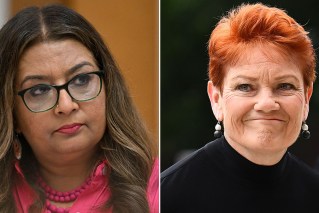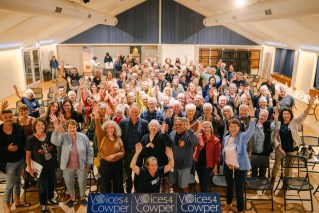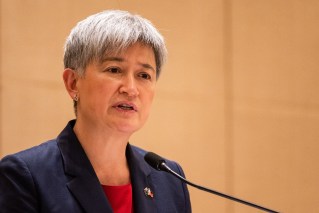Briggs ad turns heads as Voice conspiracy theories flourish online

An ad campaign by rapper Briggs that has gone viral aims to debunk voter confusion surrounding the Voice to Parliament referendum.
Co-written by Briggs and comedians Jenna Owen and Vic Zerbst, it stars the trio and was inspired by real conversations they’d all had.
The ad deals with common arguments against the Voice like “it goes too far” or “not far enough”.
Meanwhile, a small, albeit loud, collection of fringe groups continue to make extreme claims about the Voice to Parliament.
Facebook groups, Rumble videos and Telegram channels are made up of a few loosely aligned groups, including former SAS Lieutenant-Colonel Ricardo Bosi’s quasi-political extremist party AustraliaOne, Darren Bergwerf’s MyPlace Facebook network, members of the Freedom Party and other fringe figures.
This network argues that the Voice will force people to pay reparations to Indigenous Australians, claims Yes campaigner Thomas Mayo is a communist and that, as many attending public meetings and rallies opposing the Voice believe, that the referendum is a United Nations plot to take control of Australia.
The result has been a Yes campaign struggling to get in front of the onslaught of false claims from not just the fringe, but the official No spokespeople as well.
The Voice will end private land ownership
The idea that native title will threaten private land ownership has been around for decades, according to RMIT University’s fact-checkers, and the misinformation has been attached to the Voice as well.
The wording of the proposed new addition to the Constitution does not refer to native title or even land.
Dr Kate Galloway, an associate professor at Griffith University’s Law School, told RMIT University that the theory was “completely incorrect”.
“The words of the proposed constitutional change are both absolutely clear as to the boundaries of the proposal and utterly incapable of being construed as transferring title,” she said.
“These words relate solely to creating space in our system of governance for First Nations people to make representations. There is no mention of land, no mention of any other right, power, or privilege. The words are very clear.”
Claims around electoral fraud
Electoral fraud has become a common battle cry for right-wing politicians since it was popularised by Donald Trump.
Australia’s electoral system is one of the most secure and transparent in the world, making mass voter fraud nearly impossible to pull off without someone noticing and raising the alarm.
The Australian Electoral Commission allows scrutineers to observe the counting process, and the referendum will follow the same process as any federal election in terms of postal voting.
The AEC checks every returned postal vote against the electoral roll, and once marked off any duplicate received isn’t accepted.
UN conspiracy
A favourite conspiracy of the Facebook fringe claims COVID-19 vaccines, walkable cities and the Voice to Parliament are all UN plots.

The United Nations is not using the Voice to Parliament to coup Australia, no matter what a former Neighbours actress says. Photo: Getty
The Voice was initiated by Indigenous Australians through the Uluru Statement of the Heart in 2017 after the four-day First Nations National Constitutional Convention, near Uluru, wrote the petition.
The Australian Labor Party promised a vote on the constitutional change if elected at the 2022 federal election, and the United Nations has never played any part in the establishment of the referendum.
UNICEF, a United Nations’ agency that provides aid to children, supports the constitutional change but has no say about its design or implementation.
The Uluru Statement is 26 pages long
The Voice to Parliament is a key part of the Uluru Statement of the Heart, which itself is a one-page petition calling for the establishment of a constitutionally enshrined Voice and a commission for truth-telling and agreement-making.
Coalition and One Nation MPs have stated that the Uluru Statement from the Heart is 26 pages long, with Senator Jacinta Nampijinpa Price, a key figure in the No campaign, stating that the National Indigenous Australian Agency told her this.
The agency denied this, and clarified the other 25 pages are background and excerpts from the regional dialogue that eventually formulated the Uluru Statement from the Heart, released under a Freedom of Information Act request.
You can read the 439-word Uluru Statement from The Heart online.







